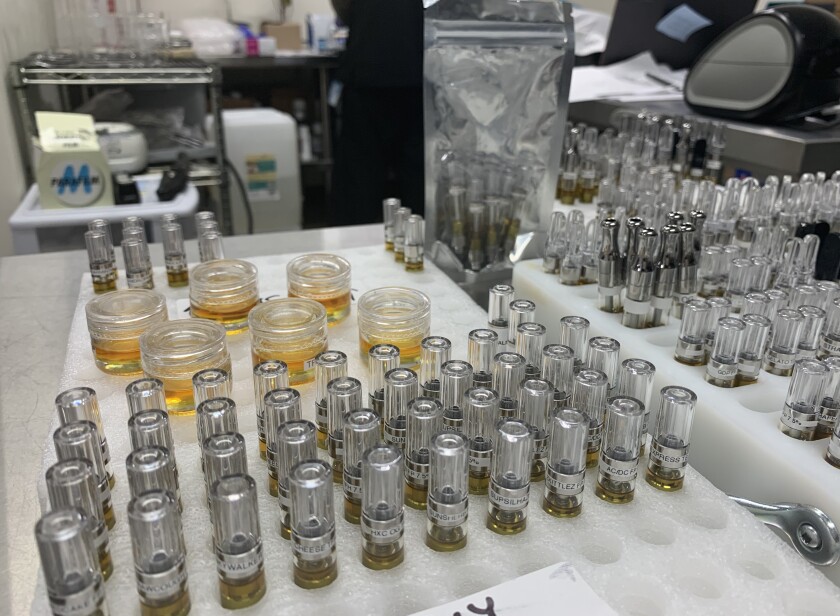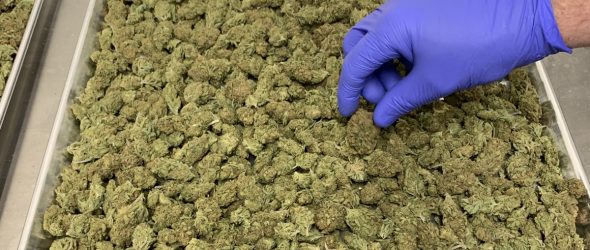When Costa Mesa voters agreed in 2016 to allow some cannabis businesses to set up shop in town, the move was greeted with hope that the city could position itself at the forefront of a soon-to-be burgeoning industry in a way that would both protect residents and inject welcome cash into the city’s coffers.
However, a little more than three years later, the anticipated budgetary boon has yet to materialize, and local industry representatives are warning that, without significant changes, Costa Mesa’s once-budding cannabis industry is at risk of withering away.
In a letter to the City Council, 21 cannabis executives asked for changes to regulations that they believe have placed a “heavy burden” on owners and “rendered Costa Mesa a non-competitive home for businesses within the cannabis space.”
Michael Moussalli — co-founder of Se7enLeaf, a local cannabis firm — said tax cuts have to happen in the next month or two because he can’t compete with other businesses. He estimates he’s lost about 15 potential clients to operations in cities that have lower taxes.
Business owners requested that the city lower its tax rate on manufacturing, distribution and testing businesses from 6% to 2%; allow home delivery, subject to a gross-receipts tax of 5%; and tax products when they exit the city to encourage Costa Mesa cannabis businesses to work together.
Industry leaders have asked the city to take action for about a year, according to the Nov. 11 letter.
The requests come as Costa Mesa’s forecast of a cannabis tax windfall has yet to come true. According to Assistant Finance Director Jennifer King, the city projected receiving $1.56 million in tax revenue from marijuana-related businesses during the 2018-19 fiscal year, but instead collected $163,803.
In its current budget, which covers the period from July 1 to June 30, the city projected $1.143 million in marijuana tax revenue. But as of December, it had banked $217,511.
Mayor Katrina Foley said she and other council members have met over the past six months or more with businesses in what the city refers to as the “green zone” — the area north of South Coast Drive and west of Harbor Boulevard where marijuana businesses are allowed to operate.
The council also created an ad hoc committee last month composed of Foley, Mayor Pro Tem John Stephens and Councilman Manuel Chavez to investigate the industry’s concerns.
“We are trying to be extremely responsive to the issues that have been raised,” Foley said. “That’s why we formed the ad hoc committee so that we could quickly gather the research and analyze their concerns, work with them, come up with proposed recommendations and solutions to present to the City Council and do that in a short order.”
But Steve Hellings, a Costa Mesa resident who owns SW Ventures — a manufacturing business that extracts and purifies oil from raw cannabis that could be used in vape cartridges — said taxes “should go down to 1% and then [council members] can do their study. When there’s no oxygen in the room, you don’t sit there and debate whether you know how much oxygen you should give people.”
Stephens said city staff “worked very hard to get these businesses permitted. I do not want them to fail. I do not want them to move.”
“It costs $50,000 to apply for a permit,” he added. “We collected that money, we went through the process.”
Though Councilwoman Sandy Genis ultimately voted to create the ad hoc committee, “part of me says, if marijuana people don’t want to be here — oh gee,” she said. “Because it wasn’t like we were doing this rolling out the welcome mat for marijuana.
“At least it’s better than a bunch of retail uses.”
Road to approval
Measure X, a ballot initiative that Costa Mesa voters approved in November 2016, allows businesses that research, test, process and manufacture some marijuana products to open in the green zone.
The process to apply for a local marijuana business permit was intended to be “grueling” so the city could get operators that are the “cream of the crop,” former Assistant City Manager Rick Francis said in 2017.
After securing a facility in the green zone, operators are required to submit multiple corporate documents, including thorough business, floor and security plans, that could take months to gather. They are charged $21,525 as an application fee and $300 per owner for a background check.
Operators that clear that step then have to apply for a conditional use permit, which costs an additional $27,508 and requires approval from the city Planning Commission.
Even if the commission signs off, operators still need to complete the plan-check phase by getting city fire prevention, finance and building safety approvals.
At the end of the whole process, they can obtain a marijuana business permit.
As of December, 34 business permit applications had been submitted and the city had granted 24 conditional use permits.
Seven manufacturers and distributors have obtained marijuana business permits, and 15 others are in the plan-check phase. The period from submitting an application to obtaining a business permit has taken from 10 months to two years.
Taxation trepidation
While Costa Mesa’s regulatory rigor is tailored to the city, the tax issue has dogged cannabis businesses statewide. Cities, counties and even the state itself have struggled to find the right level of regulation, taxation and enforcement to cultivate a thriving legalized marijuana industry that can compete with the black market.
Earlier this month, California lawmakers revived an effort to temporarily cut marijuana taxes — with Assemblyman Tom Lackey (R-Palmdale) warning that the industry is “clearly on the brink of collapse.”
According to Measure X, Costa Mesa cannabis businesses are subject to a 6% annual gross-receipts tax. By comparison, the city of Los Angeles imposes a 2% tax on manufacturers and a 1% tax on distributors and testers. Long Beach recently agreed to lower the tax rate on non-retail cannabis operations from 6% to 1%.
Though multiple factors play into why cannabis businesses are struggling — such as a lack of legal retail stores throughout the state — those in Costa Mesa’s fledgling marijuana industry say the tax level puts the city — and themselves — at a clear competitive disadvantage.
Hellings is in the final plan-check stage of the application process for SW Ventures. He brought his 7,178-square-foot facility in Suite F5 at 3505 Cadillac Ave. up to code and it’s being reviewed.
But Hellings said he is exploring possible sites in Long Beach because he can’t afford to run the Costa Mesa facility once it opens.
Within four to six months, he said, it will be a matter of when, not if, he moves his business somewhere else.

Se7enLeaf formulates products and labels for multiple cannabis brands.
(Courtesy of Se7enLeaf)
In spring 2018, Se7enLeaf became the seventh cannabis business to receive the Planning Commission’s blessing under Measure X.
The 2,299-square-foot facility in Unit M101 at 3505 Cadillac has been operational for more than a year. Marijuana brands seek out manufacturers like Se7enLeaf to formulate their products.
The Se7enLeaf facility is stocked with heavy industrial equipment that grinds flowers, pre-rolls joints, presses rosin, extracts oils and stores product. At a stainless-steel table, a handful of workers in purple gloves and white lab coats manually fill tincture bottles that are too large for the automatic filling machine. When products are manufactured, they go into a quarantine room until a third-party testing lab comes to take samples from each product to certify that they’re clean. The products are then stored for distribution.
Se7enLeaf used to also deliver products to legal retail stores but stopped after determining it wasn’t worth it given the city’s taxes and general logistics of the marketplace, according to Moussalli.
“We were distributing a third-party brand from up north, meaning a brand that we didn’t manufacture. We were straight distributing and charging them 20%,” he said. “And even at that, I think at the end of the day we were probably maybe in the green $300, $400 a month. It didn’t make sense going through the headache of operating everything.”
Now, the sole function of Se7enLeaf’s distribution license is to transport products manufactured in-house to a brand’s distributor.
When Moussalli and his partners chose to build their distributing and manufacturing business in Costa Mesa, the location was supposed to be something much more ambitious.
“Costa Mesa can serve Los Angeles, San Diego and the desert in the same day with the same van. It’s a strategic [distribution] spot,” Moussalli said. “On the manufacturing side, we are very close to Los Angeles, the biggest market in the world for cannabis right now, and we are very close to coastal cities. Huntington Beach, Laguna Beach, Newport Beach — these are communities that use cannabis heavily.”
He said he knows that because “if you look at where and how many illegal dispensaries pop up, it’s always in the beach cities. That’s [where] the most money [is] made.”
Moussalli said the recently formed ad hoc committee is good for Costa Mesa and operators, “but as far as resolving the issues we have at hand right now, I’m afraid that process is going to take too long.”
Committee’s work
The ad hoc committee’s first meeting was Jan. 10.
According to Chavez, city staff will first focus on analyzing finances, taxes and how any tweaks would affect the city and the local cannabis industry.
Though there isn’t a set timeline, Long Beach’s action “puts a positive pressure on us to act as well. So for me, it’s a blessing in disguise because it adds more urgency,” Chavez said.
According to Foley, part of the committee’s work will be to determine whether the City Council has the ability to change taxes that were established by a voter-approved measure.
“I believe that our legal team has advised us that the City Council can lower the tax but cannot increase the tax without a vote of the people,” she said.
During public comment at the Dec. 17 council meeting, former Councilwoman Wendy Leece said she read the letter from local cannabis operators and agreed with the formation of the ad hoc committee.
“I think it’s an advantage to have this business in Costa Mesa,” Leece said.
Costa Mesa resident Ann Parker told the council that “if you open up a restaurant and it fails, which a lot of restaurants do, you can’t just say, ‘Well, I don’t want to pay the regular tax, I want to pay a lower tax.’”
“These people took a risk. It’s a cash business,” Parker said. “We’re never going to know exactly how much they are making anyway, so let’s just leave it the way it is. Don’t give them a break.”
Stephens and Chavez, however, said in interviews that the cannabis industry isn’t like other businesses since it was approved by voters and is taxed at a higher rate than other wholesale businesses.
Aside from taxes, Foley said the ad hoc committee will discuss home delivery and retail. Options could include approving delivery franchise agreements with designated operators, creating a free-for-all system or not allowing delivery at all.
Local cannabis operators say they still believe the industry can flourish in Costa Mesa. Whether it does, they say, is largely up to the city.
“If [Se7enLeaf] thought this was a completely losing venture, at this point we’d be gone,” Moussalli said. “We see a path. But the question remains, will the city help us?”


